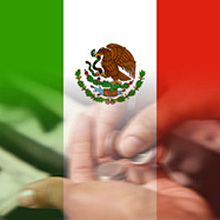
|  |  |  News Around the Republic of Mexico | January 2009 News Around the Republic of Mexico | January 2009  
Mexican Peso Slides as Money Transfers From Workers Abroad Fall
 Valerie Rota - Bloomberg Valerie Rota - Bloomberg
go to original


| | The peso lost a fifth of its value last year. |  |
Mexico’s peso fell as a central bank report showed dollar flows from immigrant workers abroad declined in November.

The currency lost a fifth of its value last year, posting its worst decline in over a decade as dollar flows from oil exports, foreign direct investment and remittances dwindled. Money transfers from workers abroad fell 11 percent during November from the same month a year ago, the central bank said. Transfers fell 2.6 percent to $21.6 billion in the first 11 months of 2008 from the same period in 2007.

The decline in remittances “shows that one of the most important sources of inflows to the Mexican economy is shrinking,” said Bartosz Pawlowski, an emerging-market strategist at TD Securities Inc. in London. “The situation in the U.S. labor market has impacted the amount of money that Mexicans send back home. That’s troublesome.”

The peso depreciated 0.4 percent to 13.7679 per U.S. dollar at 11:53 a.m. New York time, from 13.7146 yesterday. It slid 20 percent last year, the worst annual decline since 1995.

The plunging U.S. economy has put Mexican laborers out of work. About 38 percent of Mexican immigrants in the U.S. work in construction and manufacturing, according to the central bank. Transfers from abroad are heading for the first yearly decline since the central bank began tracking the data in 1995.

Oil’s Decline

Prices of oil, Mexico’s biggest source of dollar flows, fell 54 percent last year, the first annual decline since 2001. Foreign direct investment, the country’s second-biggest source of dollar-based income, fell 15 percent in the first three quarters of 2008 compared to the same period in 2007, the government said in November.

Mexican bonds rose for a third day, pushing benchmark yields to a two-week low, on mounting speculation slowing economic growth will curb inflation this year.

A central bank report next week may show annual inflation slowed to 6.5 percent by the end of December from 6.56 percent in the first half of last month, when it surged to a 7 1/2-year high, according to the median estimate of four economists surveyed by Bloomberg.

Yields on the government’s benchmark bond fell five basis points, or 0.05 percentage point, to 8.21 percent, according to Banco Santander SA. The price on the 10 percent bond due December 2024 rose 0.49 centavo to 115.85 centavos per peso.

To contact the reporter on this story: Valerie Rota in Mexico City at vrota1(at)bloomberg.net. |

 |
|  |



